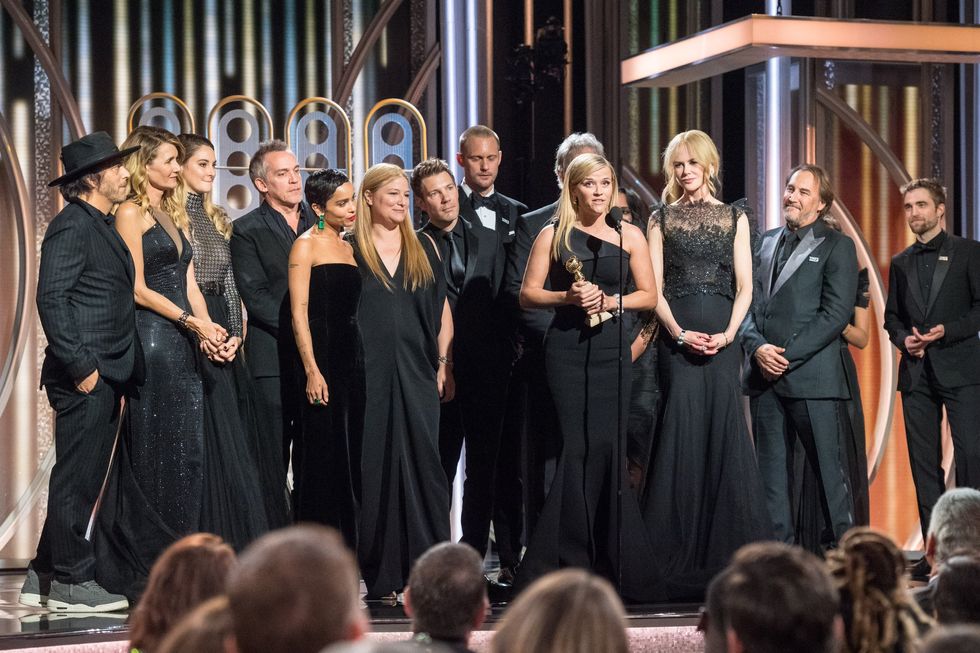Still a mere seven days into the new 2018 year, the 75th Golden Globe Awards blew viewers away not only with the overwhelming amount of talented celebrities attending but with the embracing of the #MeToo movement.
Attendees of the ceremony not only blacked out the red carpet with their all-black attire, but also pins stating "Time's Up" — a recognition of the end of the Harvey Weinstein era, and an end to the encouraged silence of sexual harassment, misconduct, and overall inappropriate behavior of Hollywood (and, honestly, everywhere).
What makes the Golden Globes' statement against imbalance within the culture of Hollywood and the workplace so revolutionary is the overwhelming support from actors, activists, and pretty much everyone watching. The visual statement of all black attire took over the black carpet — showing why they were there, instead of what they were wearing.
There is a lot of controversy in this, though.
The separation of celebrities and politics has been an encouraged stigma since the beginning of Hollywood. The entertainment industry is intended to be undisputed territory, some would argue, so that people can enjoy the movies and music they like without being forced to disagree and dispute about social and political issues.
This was made very evident in the controversy of the Dixie Chicks in 2003 and their fall from country music after stating they were "ashamed that the President of the United States is from Texas" on the eve of the invasion of Iraq. Dixie Chicks faced almost permanent backlash, having songs pulled from radio stations and fans publicly trashing CDs and other merchandise.
In later interviews about the controversy, Natalie Maines explains that the remark wasn't scripted and was made "out of frustration," but it had become very clear that a lot of people would prefer their entertainment without the baggage of controversial opinions.
A lot of people, however, would argue that it is the obligation of celebrities of high public status to speak out for what they believe in and to make a difference in the ways in which they are able. Actor Ashton Kutcher spoke in front of Congress last February on behalf of his anti-child sex trafficking campaign Thorn: Digital Defenders of Children. Leonardo DiCaprio established the Leonardo DiCaprio Foundation to educate and end environmental devastation and climate change. Elton John created the Elton John AIDS Foundation to raise awareness and find a cure for the disease. Bill Nye constantly speaks publicly about the dangers of climate change. Laverne Cox continues to campaign for LGBTQ rights activism.
While the Golden Globes this year was a definite overlap of politics in the entertainment industry, it really does revolutionize the use of politics within the Hollywood bubble.
How is it any different?
That would be the 12-year use of the hashtag #MeToo, created by Tarana Burke on MySpace in 2006 in order to "empower women through empathy". Popularized by Alyssa Milano during the allegations against Harvey Weinstein, it was only just the beginning.
The revolution of the #MeToo movement has been recognized from nearly every social media platform to Time Magazine's Person of the Year, the "Silence Breakers." The overwhelming support at the Golden Globe Awards only makes the end of this era of silence even more visual.
Breaking the silence was only the first part of this much-needed change in how we as a society communicate, and no one has such a powerful access to the public as those in the entertainment industry.
Celebrities deserve to be able to stand for what they believe without the backlash of political controversy. They are not props within the industry of entertainment. They are people, with thoughts, opinions, and human dignity — their publicity should not keep them from speaking out, but obligate them to it.
That's how the #MeToo movement was so successful.






























